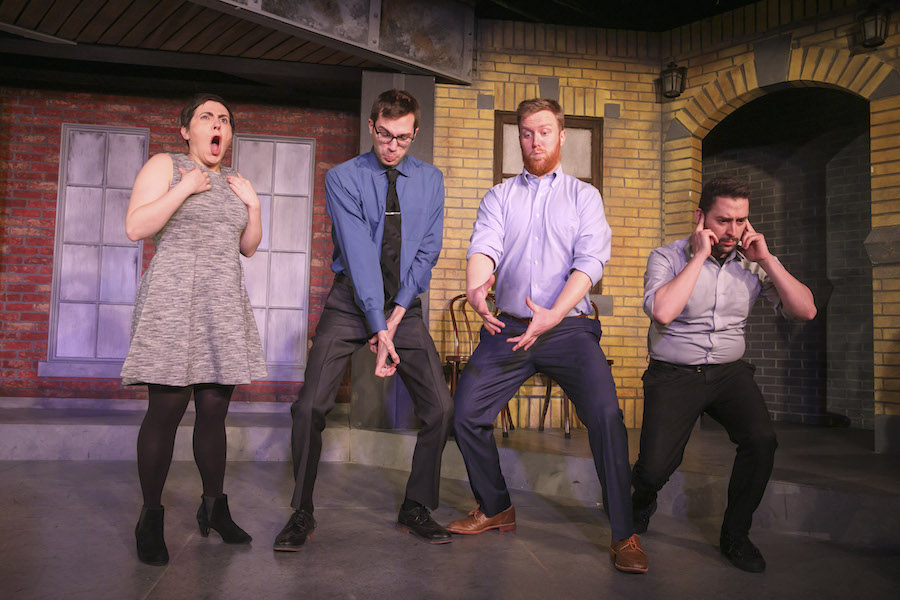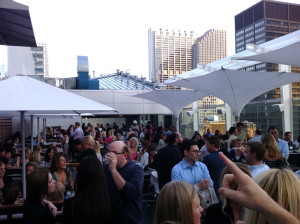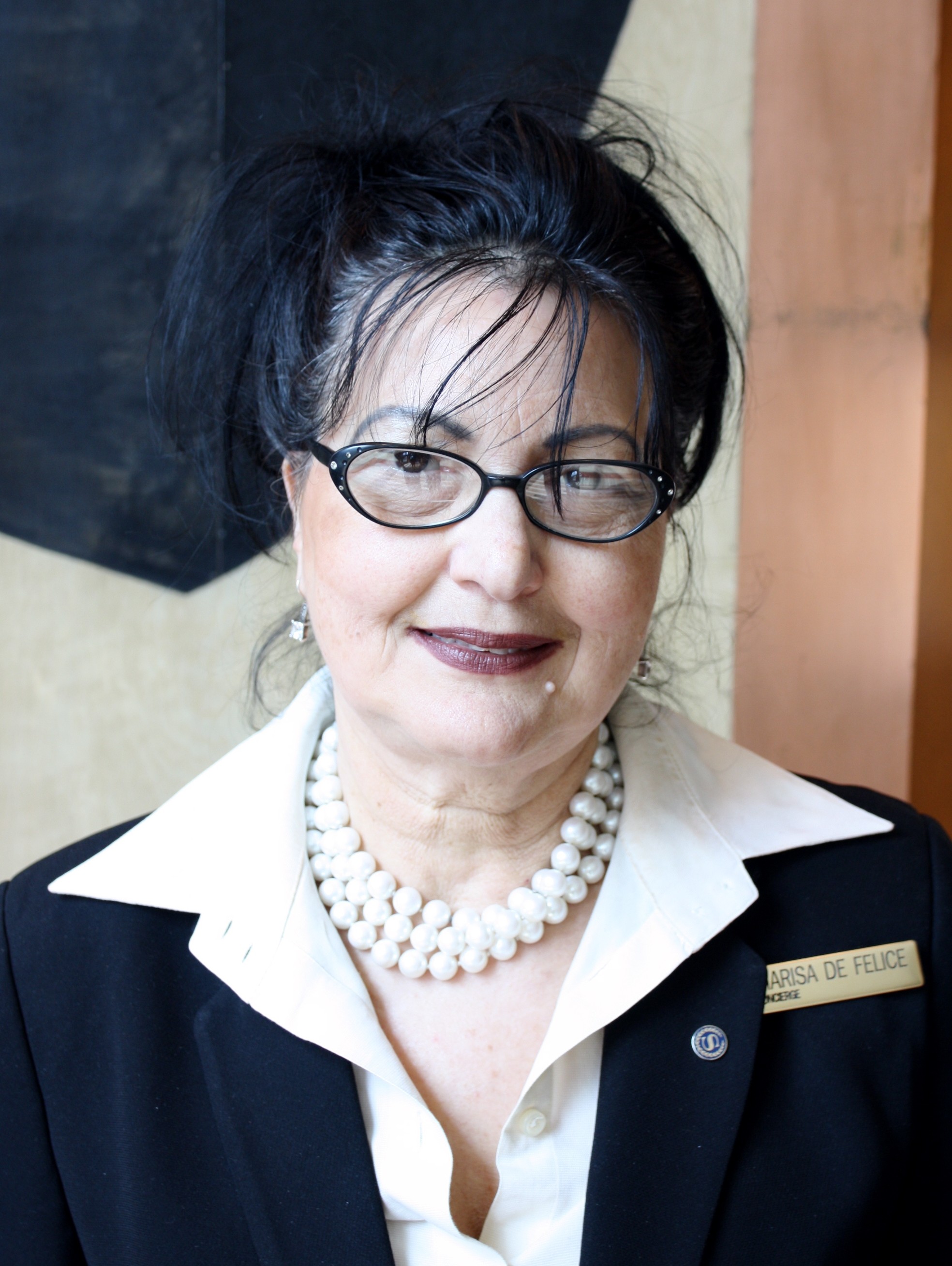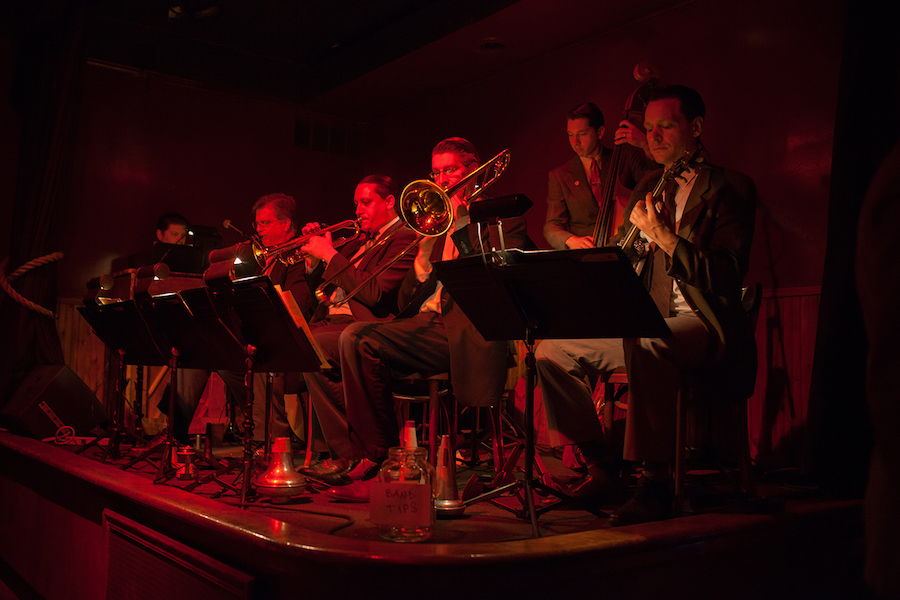We Ask, They Answer: Q&A with Second City’s Daniel Strauss about “The Incomplete Guide to Everything,” cruise ship buffets and seeing Colbert and Carell on stage
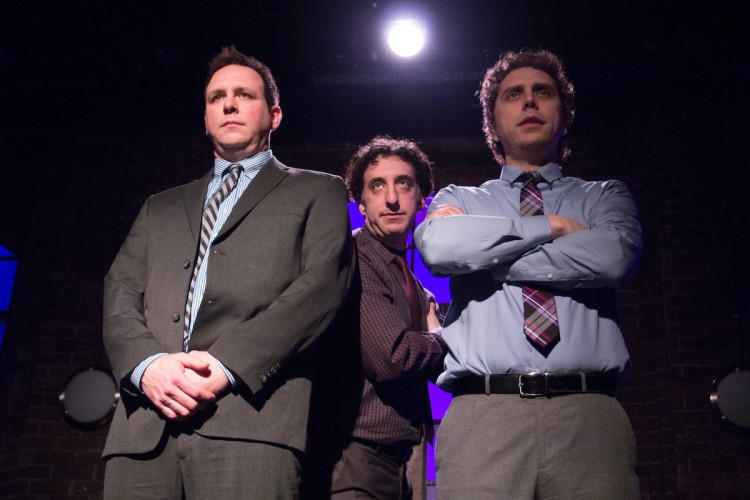
By Trent Modglin
Originally hailing from Washington, D.C., and a graduate of the University of Michigan, Daniel Strauss is an alumnus of the Second City Touring Company who has performed aboard the Norwegian Jewel. Strauss, currently starring in The Incomplete Guide to Everything at Up Comedy Club, can be found online at www.DanielStrauss.com and on YouTube in his web series, Game Bros.
For tickets to The Incomplete Guide to Everything, visit www.UPComedyClub.com 
Q: Nobody at Second City, or in any legit comedy show, comes right off the street. It seems like you have to pay your dues more than in most professions. Do you think patience is the biggest virtue for a comedian?
A: I think you have a fine line between patience and hard work. For me, patience is an element of it, but if I feel like I’m not moving forward like I want to, or things aren’t moving as quickly as I want them to, then that’s on me. It comes down to what am I not doing and what can I do to keep creating content, to keep making material and to keep pushing to make sure I’m putting myself out there and moving forward in a way that I want to be.
There are a total of nine male spots at Second City if you include the mainstage, the ETC stage and Up, and after a while, it could be like, “Hey, we love you and you’re doing a great job, but we don’t really have a spot for you right now.” And so, yeah, for that, patience is a big part of it. … Comedy and acting, as a profession, involves a whole lot of hurry up and wait.
Q: How do you think your theater background helped you in regard to your life now and at Second City?
A: Tremendously. And since I’ve gotten here, I’ve thought a lot about that and how fortunate I was to come in with that. A lot of people, when they come to the (Second City) Conservatory here, come with no theater background. Maybe they’ve done a little bit of improv at some point, or just watched a bunch of SNL or they just enjoy comedy, but for me to come in here with a background in auditioning and theater and knowing just the little things — like knowing you show up to an audition with a headshot and resume, knowing what it means to “slate” at an audition — things like that, when people see it, it works as a plus.
Additionally, having a theater background and knowing more about acting enables me to inhabit characters more. Improv, when it runs into trouble, is when you see characters having reactions that aren’t real or don’t hit home (with the audience). It happens on a subconscious level, to where it doesn’t feel like an honest reaction. And you can feel it. So I think that having a theater background and having done so many plays in the past, being able to channel that through my (sketch and improv) characters has helped me tremendously.
 Q: The Second City cruise shows sound like a great experience, but I’ve heard some funny stories about life as a performer on a cruise ship from other comedians and Second City folks. What was your time like out at sea?
Q: The Second City cruise shows sound like a great experience, but I’ve heard some funny stories about life as a performer on a cruise ship from other comedians and Second City folks. What was your time like out at sea?
A: I had a great time. I was fortunate to have a cast that I got along with and people I really liked and was able to keep up with. The really big takeaway for me was that I got to do this work every week. I was improvising every week and doing sketch comedy every week. I really learned how to do it. Because going into it, I had done a lot of improv and some writing of my own stuff, but Second City is a very specific kind of work, and I hadn’t really done any of that. You really get thrown into the deep end.
You’re protected by the fact you have the great material, because the material is always great at Second City. For a comedian or an actor to go into something going “I know this material is going to work, and I know everyone is going to have a great time” is an incredible weight off your shoulders. So you know that. And then you have these improv slots, and some nights it goes great and some nights it doesn’t. But it was getting used to that feeling — that feeling of what it’s like when it goes well, what it’s like when it doesn’t go well, what am I noticing about myself. Coming back after literally doing that for four months, I mean, you’re ready to go. It got my head into a really good place.
I came back and got right into a touring group call-back (with Second City). It was like that muscle had been exercised. I could feel it, and it was really cool. But then you are away from civilization for four or five months. There’s a reason people cruise for a week, you know what I mean? It’s a strange, strange place to live. Kinda like Groundhog Day, where you keep waking up in the same place and doing the same thing for seven days. And then after seven days, a bunch of new people get on the ship and you go through the same thing all over again, where people will stop you and say, “Hey, I saw you on the show!” It was great, though, to get the practice, not have to cook for myself or make my own bed.
 Q: You had to come back about 20 pounds heavier with all those buffets?
Q: You had to come back about 20 pounds heavier with all those buffets?
A: I did alright (laughs). I was really into working out the first three months, and then at the end, I kinda checked out. It was November at that point, and I was like, “I don’t need to worry about keeping up this great body anymore.” The buffets… you get to a point where I was so tired of the food in the buffet that I would start thinking about the buffet, and then I would be like, “You know, I think I’m just going to have some crackers.” You know? The first two or three months, don’t get me wrong. But it’s the same stuff, and it’s in warming trays and…. I remember one time we were at port, and I just wanted Burger King. It sounded really great. Burger King in Nassau. Who knows what I ate?
Q: Not to sound too cliché, like asking if you ever pinch yourself when you come to work, but do you ever have to remind yourself where you’re at? Knowing that you’re here, at Second City, walking by all the black and white photos outside, creating your own show and all the history?
A: There’s definitely moments when it hits you. It’s easy to get caught up in semantics and thinking about your career, but there are moments when you absolutely remember where you are. Especially if your parents’ friends come see the show or something. I actually had an old landlord come see the show once, and afterward he was like, “This is amazing! I can’t believe you do this. I’m just an engineer, and you get up on stage and do this!” And I was like, “Actually, I think it’s pretty impressive that you’re an engineer.”
I was here for the 50th anniversary, and that was really a moment, seeing all the living members of the SCTV cast come back. And I thought, this is real. Seeing Stephen Colbert and Steve Carell on stage was something. You have to remind yourself, this is where that happened. And this is where it continues to happen. People are still going on to do incredible things coming out of this building. And it starts to become even more surreal when it’s your friends.
I think it’s really, really important to keep reminding yourself. Because sometimes it’s easy to get down on yourself, but you have to remember where you are and the history of this place. It’s extremely humbling when you stop to think about it.
Q: My dad, no matter how many times I’ve brought him to Second City, always has to stop and look at the black and white photos of old cast members outside.
A: It’s easy to see them on the wall and (not think much about them) when you’re here every day, but if you really stop to look at them, you realize this place is something else. The history. It’s a really, really special place.
 Q: How would you describe The Incomplete Guide to Everything to someone who hasn’t seen it? What do people need to know about it?
Q: How would you describe The Incomplete Guide to Everything to someone who hasn’t seen it? What do people need to know about it?
A: It’s primarily archival, so you’re getting to see some of the best sketches from the theater’s history. But they’ve also allowed us to do some writing in this show, which is really cool. So you’re going to see original pieces, and then we’ve worked with some of those older sketches and tweaked them a little bit to put our own stamp on it. And it’s just a terrific cast. To be able to work with these people… when I got the offer and saw who I was going to be working with, I was like, “This is a hell of a lineup.”
And then there’s a ton of improv in it, which is great. Getting to take the reins off and let us just goof off. Improv is always my favorite part of any show. And to have as much as we do in this one is terrific.
Q: I would imagine the archives are so great that it would be fun to go through with a highlighter and a red pen to update them a bit.
A: Yeah, it is. I mean, times have changed, and obviously there needs to be some updating to have them make sense and tweaking them to make them work now. This show, in particular, creates more of a theatrical experience than your standard archival show. It feels more like a complete show.
Q: How much of the success of a show is a direct correlation to how cohesive the cast is?
A: Oh, I would say a huge amount. I would say if you have cast members that don’t work all that well together, it comes through on stage. Some people are really good at hiding it, but I know I’ve noticed that the show always runs better when everyone is getting along. I know we’re real fortunate in that regard. The people that I’ve gotten to work with in this show are fantastic. You’ve got (Second City) touring alums, an ETC stage alum in there. For me, it’s always great to learn from everybody else in the room. At this level, that’s my biggest thing. Every experience I have, every show that I do, I want to be able to learn something from it. And to have those people in there with me, it can be great to just be a fly on the wall and see how they operate.
Q: Do you have a favorite skit or a favorite moment in the show?
A: There are two moments I really like. There’s a song that I wrote about Tinder that I really like to do. And there’s a moment of the show where we interview audience members and take their answers and turn it into a whole improvised bit that’s really fun. We find a couple and find out how they met and how well they know each other and then ask them what’s one thing that is incomplete, or something they’ve always wanted to do together, and then we take them… wherever it is we go, throwing in obstacles along the way based on their gets (answers).
The whole cast is involved, and it’s one of those things that’s like magic because we’re using every little detail of what they told us. It’s always fun, and people are usually pretty impressed by it.
Q: When was the last time you laughed really hard?
A: (Laughing) Honestly, it was in rehearsal about four days ago when we were thinking of something that could happen to you as a result of biting your fingernails a lot. And somebody came up with “nubs.” Like you would have nubs for fingers (laughs), and pretty soon another actor started working nubs into the scene a bunch. He would be like, “Hey, look at me, I’ve got nubs.” It’s funny you ask that because nubs started to appear in like every other line of the scene, and something about that made me absolutely lose my mind. … It was for a corporate gig that’s coming up with two cast members from the show, and unfortunately “nubs” didn’t make the cut for it. But something about it, “Look at me, I’ve got nubs” was just so ridiculous.
Q: Nubs didn’t make the cut? What gives?
A: No, absolutely not. It was ridiculous. I find I take a lot of pleasure in very absurd comedy. Tim and Eric on Swim TV. Tim Heidecker released an album called Yellow River Boys, an entire album about drinking piss. It’s so disgusting with these bluesy rock songs that all somehow loop back around to being about… drinking pee. Some guy played one of the songs for me and I was dying. It probably should be something high-brow that makes me laugh, but it’s not.
Q: I find a lot of times it’s not the high-brow stuff that really gets me. I find it’s usually something odd or just the dumbest stuff.
A: I think for me, working in comedy, and working so hard to craft the perfectly worded scene, the perfectly heightened joke, that sometimes when you hear something that’s just so stupid, there’s almost a level of humor in knowing that very few other people would find it funny. Because it’s just do dumb. And sometimes you come up with something that you know you could never do anything with because it’s just so dumb. But man, if you could, that would be one hell of a world. If you could get up on stage and try “nubs” and have it hit.
Q: Hey, don’t give up on nubs. It could still happen.
A: (Sighs) Yeah, it was so funny. “Look at me, I’ve got nubs.” Moronic. So stupid. Painfully dumb.
Q: Anyone you look up to, who forced a turn toward comedy for your career?
A: Yeah, probably Tim and Eric. When I started seeing videos and their show, Tim and Eric Awesome Show Great Job. I started seeing clips, and some of their stuff was just so weird to where I was like, I can’t get my head around that. But then some of them were so incredibly, undeniably funny. They did these TV commercial parodies that would harken back to the days of early computers and the start of the internet, where everyone didn’t really understand what these things were, but they acted like they did. … Anything Mel Brooks does. Blazing Saddles, Spaceballs as a kid, The Producers. Dave Chappelle too. I used to watch Chappelle Show every Wednesday. We used to rush home from school to watch Kids in the Hall too. Some of that stuff was so ridiculous.


